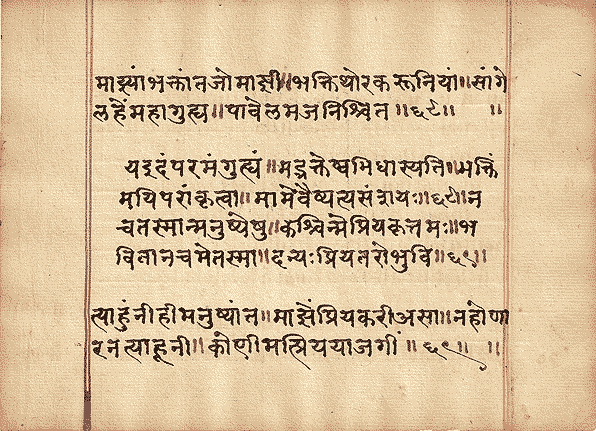
ya idaṃ paramaṃ guhyaṃ mad-bhakteṣv abhidhāsyati
bhaktiṃ mayi parāṃ kṛtvā mām evaiṣyaty asaṃśayaḥ
Update RequiredTo play the media you will need to either update your browser to a recent version or update your Flash plugin.
yaḥ (he who) idam paramam guhyam (this supreme secret) mad-bhakteṣu (among my devotees) abhidhāsyati (he will explain),
[
saḥ]
(he) mayi (in me) parām bhaktim (the supreme love) kṛtvā (after doing)
mām eva (just to me) eṣyati (he will come),
asaṁśayaḥ (without doubt) [
asti]
(it is).
| yaḥ |
– |
yat sn. 1n.1 m. – he who; |
| idam |
– |
idam 2n.1 n. – this; |
| paramam |
– |
parama 2n.1 n. – supreme, the highest (superlative of: para – beyond, ancient, final, the best, the supreme); |
| guhyam |
– |
guhya (√xguh – to cover, to hide) PF 2n.1 n. – to be hidden, secret; |
| mad-bhakteṣu |
– |
mad-bhakta 7n.3 m.; TP: mama bhakteṣv iti – among my devotees (from: mat – the basic form of a personal ponoun „I” singular used in compounds; √bhaj – to share, to love, to rejoice, to worship, PP bhakta – distributed, divided, loved; worshipper, devotee, loving); |
| abhidhāsyati |
– |
abhi-√dhā (to explain, to speak) Fut. P 1v.1 – he will explain; |
| bhaktim |
– |
bhakti 2n.1 f. – devotion, love, fondness (from: √bhaj – to share, to love, to rejoice, to worship, bhakta – distributed, divided, loved; worshipper, devotee, loving); |
| mayi |
– |
asmat sn. 7n.1 – in me; |
| parām |
– |
para 2n.1 f. – beyond, ancient, final, the best, the supreme; |
| kṛtvā |
– |
√kṛ (to do) absol. – after doing; |
| mām |
– |
asmat sn. 2n.1 – me; |
| eva |
– |
av. – certainly, just, merely; |
| eṣyati |
– |
√i (to go) Fut. P 1v.1 – he will go; |
| asaṁśayaḥ |
– |
a-saṁśaya 1n.1 m. – without doubt (from: sam-√śī – to waver); |
ya idaṁ → ya imaṁ / idaṁ yaḥ (he who this / this he who);
abhidhāsyati → abhidhāsyate (he will explain);
bhaktiṁ mayi → mayi bhaktiṁ (love to me);
mām evaiṣyaty → mām eveṣyaty / sa māmeṣyaty (just to me he will come / he will come to me);
evaiṣyaty asaṁśayaḥ → bhaviṣyati na saṁśayaḥ (he will become without doubt);
asaṁśayaḥ → asaṁśayaṁ (without doubt);
The fourth pada of verse 18.68 is similar to the fourth pada of verse BhG 8.7;
sampradāyasya kartuḥ phalam idānīm āha—
ya imaṃ yathoktaṃ paramaṃ parama-niḥśreyasārthaṃ keśavārjunayoḥ saṃvāda-rūpaṃ granthaṃ guhyaṃ gopyatamaṃ mad-bhakteṣu mayi bhaktimatsv abhidhāsyati vakṣyati, granthato’rthataś ca sthāpayiṣyatīty arthaḥ, yathā tvayi mayā | bhakteḥ punar grahaṇāt bhakti-mātreṇa kevalena śāstra-sampradāne pātraṃ bhavatīti gamyate | katham abhidhāsyatīti, ucyate—bhaktiṃ mayi parāṃ kṛtvā bhagavataḥ parama-guror acyutasya śuśrūṣā mayā kriyate ity evaṃ kṛtvety arthaḥ | tasyedaṃ phalaṃ—mām evaiṣyati mucyata eva | asaṃśayo’tra saṃśayo na kartavyaḥ
idaṃ paramaṃ guhyaṃ madbhakteṣu yaḥ abhidhāsyati vyākhyāsyati, saḥ mayi paramāṃ bhaktiṃ kṛtvā mām evaiṣyati; na tatra saṃśayaḥ
etair doṣair virahitebhyo gītā-śāstropadeṣṭuḥ phalam āha ya iti | mad-bhakteṣv abhidhāsyati mad-bhaktebhyo ya vakṣyati | sa mayi parāṃ bhaktiṃ karoti tato niḥsaṃśayaḥ san mām eva prāpnotīty arthaḥ
etad upadeṣṭuḥ phalam āha ya iti dvābhyām | parāṃ bhaktiṃ kṛtveti prathamaṃ parama-bhakti-prāptiḥ | tato mat-prāptiḥ | etad upadeṣṭur bhavati
śāstropadeṣṭuḥ phalam āha ya iti | etad upadeṣṭur ādau mat-para-bhakti-lābhas tato mat-pada-lābho bhavati

